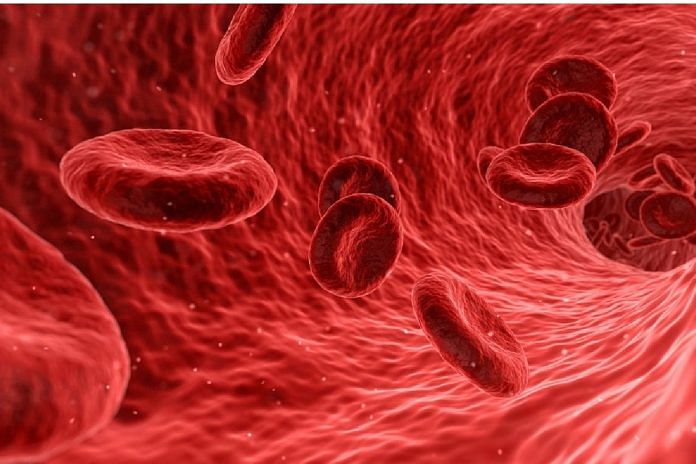New Delhi: French pharmaceutical company Sanofi’s experimental RNA injections for haemophilia patients can help reduce spontaneous bleeding in patients, according to scientists from Christian Medical College (CMC), Vellore, who were part of a pair of studies published in The Lancet and The Lancet Haematology journals Thursday.
Haemophilia is a lifelong, inherited bleeding disorder mostly affecting men. Patients with haemophilia A or B have partially or completely missing clotting factors or proteins in the blood that work together to form blood clots, which are essential for stopping bleeding.
Now, two randomised phase-3 controlled trials have found that these monthly preventive injections, known as ‘fitusiran’, can reduce bleeding in patients with haemophilia A or B.
Small interfering RNA (siRNA) therapies are a new type of treatment that work by interfering with the production of specific proteins. Fitusiran is the first siRNA developed for haemophilia and targets antithrombin — a protein that reduces blood clotting — to increase clotting ability.
This preventive or prophylactic treatment is aimed at reducing spontaneous bleeding by regularly administering drugs that enhance haemostasis, or normal blood clotting.
“The data is encouraging and suggests it may be the first prophylactic treatment — meaning it can be given to prevent bleeds rather than to treat them after they have already occurred — that works for both haemophilia A and B patients with inhibitors,” said Guy Young, lead author of The Lancet study and professor at the University of Southern California Keck School of Medicine in the US.
Inhibitors are antibodies that prevent blood from clotting. Some patients develop inhibitors as an immune system response to standard haemophilia treatments.
Also Read: No new Covid-19 variants emerged during latest outbreak in China, says study in The Lancet
Standard treatment method
When an injury occurs and a blood vessel is damaged, a series of chemical reactions is initiated that leads to the activation of clotting factors. These factors work together to produce a fibrin clot, a mesh-like structure that stops bleeding by sealing the damaged blood vessel. There are 13 different clotting factors that play a role in the clotting process.
But patients with haemophilia A or B have partially or completely missing clotting factors.
Clotting factors are produced in the liver and circulate in the blood in an inactive form. In people with haemophilia, there is a deficiency or dysfunction of one of the clotting factors leading to impaired blood clotting and a tendency to bleed easily.
Treatment for haemophilia involves replacing the missing or defective clotting factor through regular injections of clotting factor concentrates.
Currently, patients with haemophilia who are given the replacement clotting factor that are missing can develop an immune reaction against this treatment. This immune reaction triggers the development of inhibitors which render the replacement therapy ineffective and creates the need for alternative treatments that can avoid this immune reaction.
Fitusiran injections could be the answer.
Reduction in treatment burden
Both studies are the result of multinational trials called ATLAS. The study published in The Lancet was conducted in 12 countries, and the one published in The Lancet Haematology was done in 17 countries.
In The Lancet study, 25 out of 38 (66 per cent) participants with inhibitors who received fitusiran injections had zero bleeds after nine months, compared to 1 out of 19 (5 per cent) in the comparator group who were given an on-demand treatment.
The second study investigated the use of the medication in patients without inhibitors: 40 out of 79 (51 per cent) participants given monthly injections of fitusiran experienced zero bleeds, compared to 2 out of 40 (5 per cent) in the comparator group.
“Fitusiran is administered by under-the-skin injections, which can be easily taken at home. With this drug being administered just once a month or even less frequently, there is a marked reduction of treatment burden,” said Alok Srivastava, a professor at CMC Vellore and lead author of The Lancet Haematology study.
“Patients with haemophilia could manage their condition with fewer trips to hospital, which can cause worry and be disruptive to daily life. This would lead to an improved quality of life as documented in the study,” Srivastava added.
However, the treatment is yet to be approved for use outside of clinical trials.
Adverse effects, long-term efficacy
The authors note some limitations that apply across both studies. Patients were followed-up for nine months, so further studies are needed to confirm longer-term efficacy.
In addition, the patients in the trials were those with severe haemophilia, so outcomes may be different in patients with milder cases of the condition.
Young also noted that the safety outcomes in the trial need further monitoring.
“Two participants receiving fitusiran experienced blood clotting, which is a risk for treatments that seek to rebalance haemostasis. The most common adverse effect was increased alanine aminotransferase, which is seen with many medications and indicates liver inflammation,” Young said. Alanine aminotransferase is an enzyme found primarily in the liver and kidney.
The researchers said that although fitusiran did not result in any long-term liver damage, the adverse effects need continued assessment.
“Regulators will need to assess the benefits and risks of the drug when deciding whether to approve its use and for which patients it is suitable,” Young said.
(Edited by Anumeha Saxena)
Also Read: New drug for acute leukaemia leads 53% to complete or partial remission in US trials



